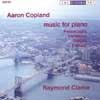Copland Piano Works
Playing that’s worthy of these Copland works albeit let down by the sound
View record and artist detailsRecord and Artist Details
Composer or Director: Aaron Copland
Genre:
Instrumental
Label: Divine Art
Magazine Review Date: 2/2004
Media Format: CD or Download
Media Runtime: 77
Catalogue Number: 2-5016

Tracks:
| Composition | Artist Credit |
|---|---|
| Passacaglia |
Aaron Copland, Composer
Aaron Copland, Composer Raymond Clarke, Piano |
| Piano Fantasy |
Aaron Copland, Composer
Aaron Copland, Composer Raymond Clarke, Piano |
| Variations |
Aaron Copland, Composer
Aaron Copland, Composer Raymond Clarke, Piano |
| Sonata for Piano |
Aaron Copland, Composer
Aaron Copland, Composer Raymond Clarke, Piano |
Author: Peter Dickinson
This is a well-chosen programme usefully representing Copland’s three major piano works, although there might have been a case for including the fine late piece called Night Thoughts rather than the immature student Passacaglia written for Boulanger and published in Paris. This, however, is a significant step forward from the even earlier Sonata in G, an unpublished academic exercise premièred by Ramon Salvatore in 1995 and recorded. Raymond Clarke’s thoughtful CD booklet notes rightly make the connection between the sectional construction of the Passacaglia and the Piano Variations eight years later.
We need a definitive recording of the Piano Fantasy and Clarke is exactly the kind of performer to deliver it. Unfortunately he is let down by the metallic quality of the piano in the middle register and the tuning keeps slipping after the more strident passages. Clarke explains that Copland’s pianism does require some hard hitting but it doesn’t need to sound like this.
As usual all Clarke’s interpretations are scrupulous. Occasionally Copland’s gentler markings – such as ‘with sentiment’ in the first movement of the Sonata – come across as slightly insensitive. But the slow music in the last movement achieves a magical atmosphere in response to the music’s sustained immobility. However, the recording fails to contain the loud passages in the middle.
In the Fantasy, as elsewhere, Clarke is in complete command of the passagework in this utterly uncompromising half-hour epic, whereas Salvatore, although better recorded, is casual about the note values of the declamatory opening. Overall this release is a disappointment. First-class playing; second-class piano.
We need a definitive recording of the Piano Fantasy and Clarke is exactly the kind of performer to deliver it. Unfortunately he is let down by the metallic quality of the piano in the middle register and the tuning keeps slipping after the more strident passages. Clarke explains that Copland’s pianism does require some hard hitting but it doesn’t need to sound like this.
As usual all Clarke’s interpretations are scrupulous. Occasionally Copland’s gentler markings – such as ‘with sentiment’ in the first movement of the Sonata – come across as slightly insensitive. But the slow music in the last movement achieves a magical atmosphere in response to the music’s sustained immobility. However, the recording fails to contain the loud passages in the middle.
In the Fantasy, as elsewhere, Clarke is in complete command of the passagework in this utterly uncompromising half-hour epic, whereas Salvatore, although better recorded, is casual about the note values of the declamatory opening. Overall this release is a disappointment. First-class playing; second-class piano.
Discover the world's largest classical music catalogue with Presto Music.

Gramophone Digital Club
- Digital Edition
- Digital Archive
- Reviews Database
- Full website access
From £8.75 / month
Subscribe
Gramophone Full Club
- Print Edition
- Digital Edition
- Digital Archive
- Reviews Database
- Full website access
From £11.00 / month
Subscribe
If you are a library, university or other organisation that would be interested in an institutional subscription to Gramophone please click here for further information.




